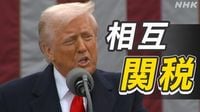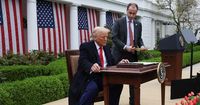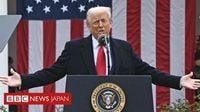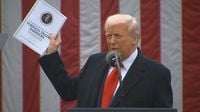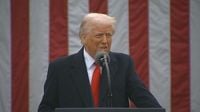On April 2, 2025, U.S. President Donald Trump announced a significant shift in trade policy, declaring that Japan would be subjected to a hefty 24% reciprocal tariff. This announcement came during a speech at the White House, where Trump emphasized the need for the U.S. to respond to the tariffs imposed by its trading partners, particularly Japan, which he claimed imposes an average tariff of 46% on American goods.
The reciprocal tariff is part of a broader strategy that includes a minimum tariff of 10% on all imports. This policy aims to raise the import tax rate to match that of trading partners, taking into account not only tariffs but also non-tariff barriers and other unfair practices. The announcement has raised concerns about the potential impact on the global economy.
Trump's remarks highlighted the particularly high tariffs Japan imposes on U.S. rice, which he noted is subject to a staggering 700% tariff. He stated, "Japan, a friend of ours, imposes a 700% tariff on American rice." This comment underscores the ongoing trade tensions between the two nations.
According to trade statistics from Japan's Ministry of Finance, exports to the U.S. in 2024 amounted to approximately 21 trillion yen, accounting for about 20% of Japan's total exports. The largest export category was completed automobiles, which already face a 25% tariff, amounting to over 6 trillion yen. Other significant exports include automobile parts and engines.
The announcement of the reciprocal tariffs sent shockwaves through financial markets, leading to a sharp decline in stock prices. The Nikkei average plummeted by over 1600 yen, while the dollar/yen exchange rate fell to around 147 yen, marking its lowest point in three weeks. Analysts predict that these tariffs could have a substantial negative impact on Japan's economy, with estimates suggesting a reduction in the country's GDP by as much as 0.59%. When combined with the existing automobile tariffs, the downward pressure on GDP could increase to 0.79%.
Economy, Trade and Industry Minister Kenjiro Komura had attempted to negotiate Japan's exclusion from the tariff list prior to the announcement, engaging in discussions with U.S. Secretary of Commerce Ratnick. Despite these efforts, he was unable to secure any assurances. In a press conference following the announcement, Komura reiterated Japan's commitment to working closely with the U.S. to address the situation, stating, "We will work persistently to take necessary actions while closely cooperating with the United States."
During his speech, Trump also reflected on his previous interactions with former Japanese Prime Minister Shinzo Abe, recalling, "I once went to him and said, Shinzo, we have to do something. Trade is not fair." He praised Abe's understanding of trade issues, stating, "He is a wonderful man. He immediately understood what I was trying to say." This sentiment highlights the complex relationship between the U.S. and Japan, particularly in the context of trade negotiations.
The reciprocal tariffs will not only affect Japan but will also impose varying rates on other countries. For instance, Cambodia will face a 49% tariff, Vietnam 46%, China 34%, Taiwan 32%, and South Korea 30%. The uniform 10% tariff on all countries will take effect on April 5, 2025, while the specific rates for individual countries will come into effect on April 9, 2025.
Trump described these tariffs as "not complete reciprocal tariffs, but friendly reciprocal tariffs," suggesting a more diplomatic approach despite the harsh economic implications. He stated, "It is a day of liberation that we have been waiting for a long time. April 2, 2025, will be eternally remembered as the day American industry was reborn, the day America's destiny was taken back, and the day we began to make America prosperous again."
As the situation develops, the implications for Japan's economy and its relationship with the U.S. remain uncertain. The tariffs could strain trade relations further, especially given Japan's significant reliance on exports to the U.S. The economic repercussions of these tariffs will likely be felt across various sectors, particularly the automotive industry, which is a major contributor to Japan's economy.
In conclusion, President Trump's announcement of reciprocal tariffs marks a pivotal moment in U.S.-Japan trade relations, introducing a new layer of complexity to an already intricate economic partnership. As both nations navigate this challenging landscape, the focus will be on how they manage these tariffs and their broader implications for international trade.
